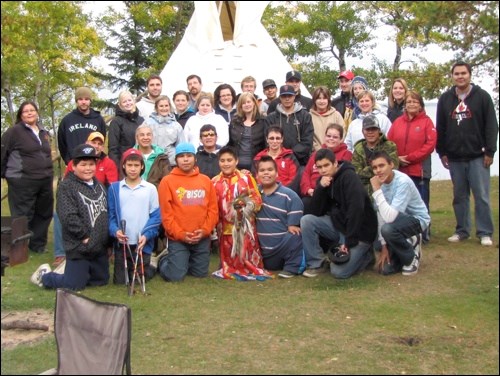Twenty-two teachers from schools across the Northwest School Division participated in the third annual First Nations Partnership Aboriginal Cultural Retreat at Waterhen Lake in mid-September.
The camp, which was spearheaded by the Northwest School Division's Gary Mirasty and Terry Craig in partnership with the Meadow Lake Tribal Council's Pat Gervais, brings in local presenters as well as people from across the province to share their expertise.
"It's a great experience," said Mirasty. "As far as I know no other provincial school divisions do anything like this. It's setting a great example for the other divisions."
The program for the retreat followed traditional protocol in both programming and setting. Sessions were held in teepees and began with a pipe ceremony and prayers each morning.
On the first morning participants were able to listen to Cree elders as they explained the reasons behind, and the significance of the pipe ceremony. Then, following a keynote address from Judy Bear, a Cree elder from Sweetgrass First Nation, the teachers took part in three seminars: Teaching Treaties, delivered by Susan Beaudin and Elder Agnes Wapass-Greyeyes (both from the Office of the Treaty Commission) and Terry Craig (principal of Lakeview Elementary School); traditional cultural teachings given by Judy Bear; and traditional outdoor education facilitated by Kevin Lewis, education portfolio holder from Island Lake First Nation.
Participants in the outdoor education session were able to tour through the beautiful boreal forest south of Waterhen Lake and learn about the wealth of useful materials available in the forest itself: from how to harvest spruce tree roots for cordage to the medicinal/traditional uses of Kinnikinnick and Labrador Tea. At the same time the importance of sharing knowledge as a way of helping to overcome the disconnection of people with nature was also addressed in a meaningful way.
Participants were treated to a traditional meal of wild meat and fish, bannock and berries and were then able to spend time exploring the lake and forests before gathering around a campfire and listening to the stories and songs of the celebrated storyteller, singer/song writer and actor Joseph Naytowhow.
A Matotisin (sweat lodge) ceremony prepared by Robert Gladue, the sweat lodge keeper, was held on each of the two days and the people who took part were able to both actually participate and gain a deep understanding of the customs and the meaning of the ritual.
"The sweat lodge was the highlight of my two days," said teacher Cameron Watson. "The elders and the guys who helped out were unbelievable, and the stories were amazing and moving."
After the pipe ceremony the next day teachers attended a session on medicine wheel (the cycles and circle of life) teachings by Marg Reynolds, a Dene elder from English River First Nation, a seminar on myths, legends and hand drum teachings by Naytowhow and a practical workshop that focused on techniques for making bannock over an open fire with Marg Reynolds and Pat Gervais, a community schools consultant for the MLTC.
Following the morning's sessions and an excellent lunch, a keynote address that discussed the incorporation of an aboriginal perspective into teaching programs and Indian Control of Indian Education was presented by Judy Okanee director of education for the MLTC. The retreat finished off with a great show put on by the Waterhen School Hand Drum Singers who both sang and performed a round dance.
"The program affords teachers insights into the history and culture of First Nations people," said Mirasty, aboriginal education partnership consultant.
"Learning about cultural differences helps teachers to become more comfortable teaching aboriginal children and facilitates the establishment of a good working relationship based on mutual respect."
Gary's sentiments were echoed by a thoughtful Naytowhow.
"The school division is doing an incredible job informing the teachers who are here about the importance of understanding the behavioural characteristics of the native kids they will be dealing with," he said.
"It's important that people are able to understand and embrace the stories as a part of our - and I mean all Canadians' - collective history."
"It was very valuable," Cam Watson remarked, "I think you need to know about the culture to be able to teach properly, and to teach properly about First Nations culture is a necessity all over Saskatchewan. I would definitely recommend this to any teacher in a school system. It's a good thing being done by people who are trying to make a difference and a change."




